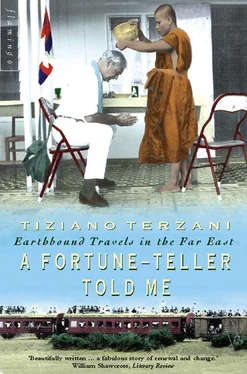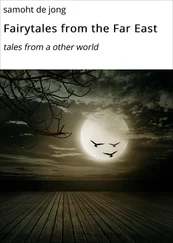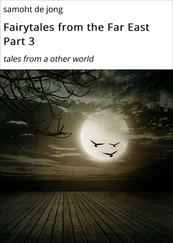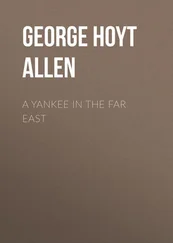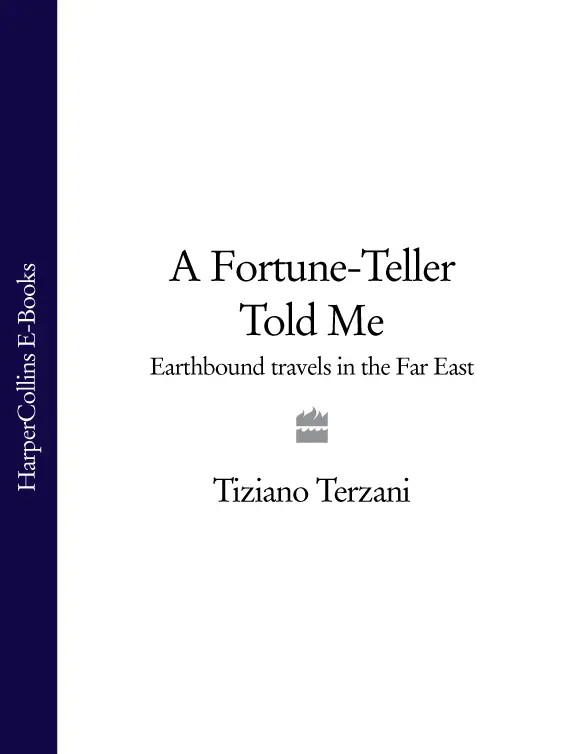
A Fortune-Teller Told Me
Earthbound Travels in the Far East
Tiziano Terzani
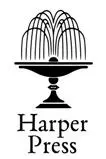
For Angela, always
Cover Page
Title Page A Fortune-Teller Told Me Earthbound Travels in the Far East Tiziano Terzani
CHAPTER ONE A Blessed Curse
CHAPTER TWO A Death that Failed
CHAPTER THREE On Which Shore Lies Happiness?
CHAPTER FOUR The Body-Snatchers of Bangkok
CHAPTER FIVE Farewell, Burma
CHAPTER SIX Widows and Broken Pots
CHAPTER SEVEN Dreams of a Monk
CHAPTER EIGHT Against AIDS? Raw Garlic and Red Peppers
CHAPTER NINE The Rainbow Gone Mad
CHAPTER TEN Sores Under the Veil
CHAPTER ELEVEN The Murmurs of Malacca
CHAPTER TWELVE An Air-Conditioned Island
CHAPTER THIRTEEN A Voice from Two Thousand Years Ago
CHAPTER FOURTEEN Never Against the Sun
CHAPTER FIFTEEN The Missionary and the Magician
CHAPTER SIXTEEN Hurray for Ships!
CHAPTER SEVENTEEN The Nagarose
CHAPTER EIGHTEEN Buddha’s Eyelash
CHAPTER NINETEEN The Destiny of Dogs
CHAPTER TWENTY A Ship in the Desert
CHAPTER TWENTY-ONE With my Friend the Ghost
CHAPTER TWENTY-TWO The Peddlers of the Trans-Siberian Railway
CHAPTER TWENTY-THREE Better than Working in a Bank
CHAPTER TWENTY-FOUR The Rhymeless Astrologer
CHAPTER TWENTY-FIVE TV for the Headhunters
CHAPTER TWENTY-SIX New Year’s Eve with the Devil
CHAPTER TWENTY-SEVEN The Spy who Meditates
EPILOGUE And Now What?
Index
About the Author
By the Same Author
Copyright
About the Publisher
CHAPTER ONE A Blessed Curse
Life is full of opportunities. The problem is to recognize them when they present themselves, and that isn’t always easy. Mine, for instance, had all the marks of a curse: ‘ Beware! You run a grave risk of dying in 1993 – You mustn’t fly that year. Don’t fly, not even once,’ a fortune-teller told me.
It happened in Hong Kong. I had come across that old Chinese man by sheer chance. When I heard his dire words I was momentarily taken aback, but not deeply disturbed. It was the spring of 1976, and 1993 seemed a long way off. I did not forget the date, however; it lingered at the back of my mind, rather like an appointment one hasn’t yet decided whether to keep or not.
1977…1987…1990…1991. Sixteen years seem an eternity, especially when viewed from the perspective of Day One. But, like all our years (except those of adolescence), they passed very quickly, and in no time at all I found myself at the end of 1992. Well, then, what was I to do? Take that old Chinese man’s warning seriously and reorganize my life? Or pretend it had never happened and carry on regardless, telling myself, ‘To hell with fortune-tellers and all their rubbish’?
By that time I had been living in Asia solidly for over twenty years – first in Singapore, then in Hong Kong, Peking, Tokyo, and finally in Bangkok – and I felt that the best way of confronting the prophecy was the Asian one: not to fight against it, but to submit.
‘You believe in it, then?’ teased my fellow-journalists – especially the Western ones, the sort of people who are used to demanding a clear-cut yes or no to every question, even to such an ill-framed one as this. But we do not have to believe the weather forecast to carry an umbrella on a cloudy day. Rain is a possibility, the umbrella a precaution. Why tempt fate if fate itself gives you a sign, a hint? When the roulette ball lands on the black three or four times in a row, some gamblers count on statistical probability and bet all their money on the red. Not me: I bet on the black again. Has the ball itself not winked at me?
And then, the idea of not flying for a whole year was an attraction in itself. A challenge, first and foremost. It really tickled me to pretend an old Chinese in Hong Kong might hold the key to my future. It felt like taking the first step into an unknown world. I was curious to see where more steps in the same direction would lead. If nothing else, they would introduce me, for a while, to a different life from the one I normally led.
For years I have travelled by plane, my profession taking me to the craziest places on earth, places where wars are being waged, where revolutions break out or terrible disasters occur. Obviously I had held my breath on more than one occasion – landing with an engine in flames, or with a mechanic squeezed in a trapdoor between the seats, hammering away at the undercarriage that was refusing to descend.
If I had dismissed the prophecy and carried on flying in 1993, I would certainly have done so with more than the usual pinch of anxiety that sooner or later strikes all those – including pilots – who spend much of their lives in the air; but I would have carried on with my normal routine: planes, taxis, hotels, taxis, planes. That divine warning (yes: ‘divination’, ‘divine’, so alike!) gave me a chance – in a way obliged me – to inject a variant into my days.
The prophecy was a pretext. The truth is that at fifty-five one has a strong urge to give one’s life a touch of poetry, to take a fresh look at the world, reread the classics, rediscover that the sun rises, that there is a moon in the sky and that there is more to time than the clock’s tick can tell us. This was my chance, and I could not let it slip.
But there was a practical problem. Should I stop working for a year? Take leave of absence? Or carry on working despite this limitation? Journalism, like many other professions, is now dominated by electronics. Computers, modems, fax play a paramount role. Snappy, instantaneous television images transmitted by satellite have set new standards, and print journalism, rather than concentrating on reflection and the personal, limps after them in the effort to match the invincible immediacy (and with it the superficiality) of TV.
During the days of the Tiananmen massacre, CNN was broadcasting live from the square in the centre of Peking, and many of my colleagues preferred to stay in their hotel rooms and watch television rather than go out and see what was happening a few hundred yards away. That was the quickest way of keeping up to date, of following events. Moreover, their editors were seeing – thousands of miles away – the same images on their screens; and those images became the truth, the only truth. No need to look for another.
How would my editors react to the idea of having an Asia correspondent who, on a whim, took into his head not to fly for a whole year? What would they think of a man who in 1993 suddenly became a journalist from the beginning of the twentieth century, one of those who would set off at the outbreak of a war and would often arrive when it was already over?
My chance to find out came in October 1992, when one of the two editors-in-chief of Der Spiegel passed through Bangkok. One evening after dinner, without much beating about the bush, I told him the story of the Hong Kong fortune-teller and announced my intention of not travelling by plane in 1993.
‘After what you’ve told me, how can I ask you to fly to Manila and cover the next coup d’etat, or to Bangladesh for the next typhoon? Do as you think best,’ was his reply. Magnificent as usual, my faraway masters! They saw that this caprice of mine might give rise to a different kind of story, one that might offer the reader something the others lacked.
Читать дальше
